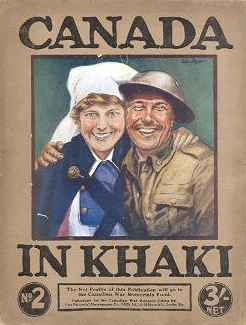“Somewhere in Flanders”
The Weekly Gazette 1915-11-12
May 29th, 1915
It is a far cry from Vancouver to this part of the firing line, but I couldn’t help wishing some of you could have listened to the bombardment of “Aubers Ridge” and the German trenches in the immediate neighbourhood on a recent Sunday morning.
About 2:30 a.m. I was awakened by the singing and twittering of birds in the trees overhead – at 4:30 a.m. we were all up and ready. – at 5 a.m. punctual our guns started, and pretty soon every gun and howitzer along our line was busy, from the 15 inch howitzer, which throws a projectile weighing 14 cwt, an effective distance of eleven miles, down to the smallest caliber gun.
I’ve never heard anything like it in all my life, and no description however graphic, can possibly convey to you the very faintest idea of what it was like. You must try and imagine the worst thunder storm you ever heard on the prairie, add to this the vibration and noise of a heavy freight train travelling through an interminably long tunnel, multiply all this a thousand fold and you may begin to realize something of the racket and noise. After the batteries, siege, heavy, horse and field had rained thousands of lyddite and shrapnel on the German trenches and wire entanglements for nearly an hour the bombardment proper ceased while our infantry advanced to take the trenches which our artillery had been shelling so assiduously.
After such an experience one would think that nothing, not even a fly, could escape being hit, but when our infantry clambered over their own trenches and started in a perfect line to advance and capture the enemy’s trenches they were met with a raking fire from the perfectly concealed machine guns of the Germans, which swept the ranks and mowed our boys down in hundreds, many of the poor beggers dropping within a short distance of the enemy’s trenches, wounded and unable to move, were compelled to lie there, because no one could reach them to render assistance, those who were not wounded had to dig themselves in with their entrenching tools, and await the dusk of evening to get back to their own trenches. Later in the day another attack was made, but although our guns still continued to shell the enemy in various places, it was decided advisable not to waste any further lives as the enemy’s positions were much too strong. Reading the home papers since I read that one reason that the attack was not the success it might have been was that there was a dearth of high explosives, but personally my own opinions are not in consonance with the said critics. One thing is certain, however, that if we did not attain the success we might have it was no fault of the men who fought like heroes – and another part of our line was busy gaining position after position.
A few hours after the scrap started I met scores of wounded coming back from the trenches, the worst cases being conveyed in motor ambulances to the nearest hospital, others able to walk were coming down the road wrapped up in bandages, their khaki torn and blood bespattered, muddy puttees and boots, some of them minus caps, and yet even the youngest looking of the bunch with a smile, many of them with a “Woodbine” between their lips.
Seemed funny to me that even when the bombardment was at its height and when the earth seemed to tremble as though by an earthquake, the ordinary daily avocations of the French provincial town were going as per usual, men, women and boys working in the fields, even the tiny mites toddling across the roads, running the risks of either being run down by the stream of ambulances, motor cycles, ammunition or convoy parties. I suppose it is a sort of Fatalism, or perhaps the familiarity that breeds contempt.
All around here there are lots of houses that are mere shells from former attentions of the German gunners, and even yet an occasional shell is dropped over, and yet the people are still occupying them; most of the Churches are mere ruins, one near here is just a pile of brick and masonry, but a portion of the tower is still standing, and doubtless visible from the German lines, as they still pay it attention.
As I write the German anti-aircraft guns are sending shot after shot at a couple of our airmen overhead, but although at times it seems as though they must be brought down they are just emerging from a ring of smoke puffs and gradually getting out of range. This is a daily occurrence on both sides and though I used to think an airman had a poor chance of escape I now know he stands a better chance of escaping than if he were below.
Must now ring off, but if you have not had an overdose in this I may repeat these notes on a future occasion.
Yours, etc., “MAC”

